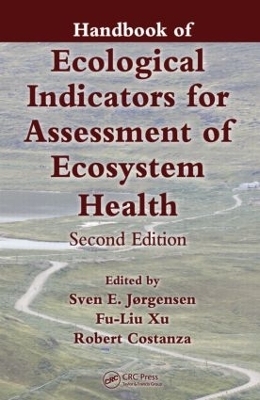
Handbook of Ecological Indicators for Assessment of Ecosystem Health
Crc Press Inc (Verlag)
978-1-4398-0936-5 (ISBN)
Continuing in the tradition of its bestselling predecessor, the Handbook of Ecological Indicators for Assessment of Ecosystem Health, Second Edition brings together world-class editors and contributors who have been at the forefront of ecosystem health assessment research for decades, to provide a sound approach to environmental management and sustainable development.
Significantly updated and expanded, this authoritative resource details a proven framework for selecting, evaluating, and validating ecological indicators for ecosystem health assessment. It guides readers through the application of this framework to a wide range of ecosystems, including wetlands, estuaries, coastal zones, lakes, forests, marine ecosystems, lagoons, agricultural systems, landscapes, and rivers. The text synthesizes material from a variety of books, journals, and private research, to consider biodiversity, energy needs, ecological economics, and natural capital in the measurement of ecological health.
Organized for ease of reference, the first part of the handbook provides the required theoretical background. It presents a complete overview of all relevant ecological indicators—including thermodynamics, resilience estimates, exergy, and emergy indicators. The second part focuses on how to effectively apply the ecological indicators to a number of important ecosystems. It includes many examples and case studies that clearly illustrate the advantages and disadvantages of each method for specific applications.
Offering first-hand insight and practical guidance from practitioners in the field, this complete resource supplies the tools and the well-rounded understanding required to diagnose the health of virtually any ecosystem with much improved accuracy.
Dr. Sven Erik Jørgensen is a professor of environmental chemistry at Copenhagen University. He received a doctorate of engineering in environmental technology and a doctorate of science in ecological modeling. He is an honorable doctor of science at Coimbra University, Portugal, and at Dar es Salaam University, Tanzania. He was editor in chief of Ecological Modelling from the journal’s inception in 1975 to 2009. He has also been the editor in chief of Encyclopedia of Ecology. In 2004 Dr. Jorgensen was awarded the Stockholm Water Prize and the Prigogine Prize. He was awarded the Einstein Professorship by the Chinese Academy of Science in 2005. In 2007 he received the Pascal medal and was elected a member of the European Academy of Science. He has written close to 350 papers, most of which have been published in international peer reviewed journals. He has edited or written 64 books. Dr. Jorgensen has given lectures and courses in ecological modeling, ecosystem theory, and ecological engineering worldwide. Dr. Fu-Liu Xu is a professor at the College of Urban and Environmental Sciences, Peking University, China. He received his Ph.D. from the Department of Pharmaceutics and Analytical Chemistry, Faculty of Pharmaceutical Sciences, University of Copenhagen, Denmark. His research interests include ecosystem health and ecological indicators, system ecology and ecological modeling, ecotoxicology and risk assessment of POPs. Dr. Robert Costanza is the Gordon and Lulie Gund Professor of Ecological Economics and founding director of the Gund Institute for Ecological Economics at the University of Vermont. His transdisciplinary research integrates the study of humans and the rest of nature to address research, policy and management issues on multiple scales, from small watersheds to the global system. He is co-founder and past president of the International Society for Ecological Economics, and was founding chief editor of the society’s journal, Ecological Economics. He has published over 400 papers and 20 books. His awards include a Kellogg National Fellowship, the Society for Conservation Biology Distinguished Achievement Award, and a Pew Scholarship in Conservation and the Environment.
Ecological Indicators. Indicators for the Assessment of Ecosystem Health. Eco-Exergy as Ecological Indicator. Emergy Indices of Biodiversity and Ecosystem Dynamics. Eco-Exergy to Emergy Flow Ratio for the Assessment of Ecosystem Health. Natural Capital Security / Vulnerability Related to Disturbance in a Panarchy of Social-Ecological Landscapes. Species Richness in Space and Time as an Indicator of Human Activity and Ecological Change. Landscape Development Intensity and Pollutant Emergy/Empower Density Indices as Indicators of Ecosystem Health. Ecosystem Services and Ecological Indicators. Assessment of Ecosystem Health. Application of Ecological Indicators for the Assessment of Wetland Ecosystem Health. Application of Ecological Indicators for the Assessment of Ecosystem Health in Estuaries and Coastal Zones; Application of Ecological and Thermodynamic Indicators for the Assessment of Ecosystem Health of Lakes; Application of Ecological Indicators in Forest Management in Africa; Using Ecological Indicators to Assess the Health of Marine Ecosystems: The North Atlantic. Indicators for the Management of Coastal Lagoons: Sacca di Goro Case Study. Ecosystem Indicators for the Integrated Management of Landscape Health and Integrity. Integrated Indicators for Evaluating Ecosystem Health: An Application to Agricultural Systems. Ecological Indicators to Assess the Health of River Ecosystems.
| Erscheint lt. Verlag | 26.4.2010 |
|---|---|
| Reihe/Serie | Applied Ecology and Environmental Management |
| Zusatzinfo | 75 Tables, black and white; 101 Illustrations, black and white |
| Verlagsort | Bosa Roca |
| Sprache | englisch |
| Maße | 156 x 234 mm |
| Gewicht | 834 g |
| Themenwelt | Naturwissenschaften ► Biologie ► Ökologie / Naturschutz |
| ISBN-10 | 1-4398-0936-4 / 1439809364 |
| ISBN-13 | 978-1-4398-0936-5 / 9781439809365 |
| Zustand | Neuware |
| Haben Sie eine Frage zum Produkt? |
aus dem Bereich


